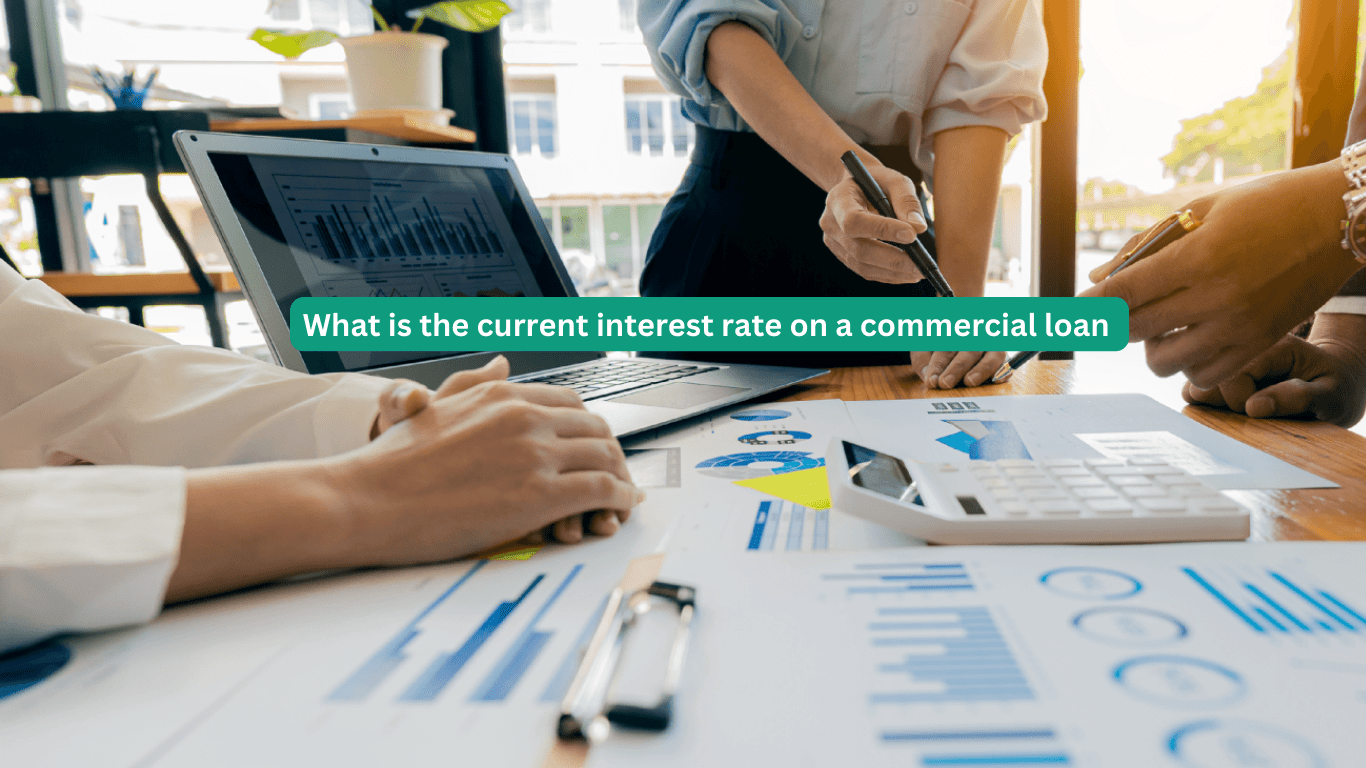One of the most important things to know when thinking about getting a business loan is the current interest rate. Commercial loans are an essential source of funding for companies, offering the funds required for a range of goals like growth, acquisition of equipment, or running costs. But the total cost and viability of borrowing can be greatly impacted by the interest rate on these loans. We’ll examine the current commercial loan interest rate environment, the variables that affect these rates, and advice for obtaining the best terms in this post.
Introduction
Businesses can obtain funding for their expansion goals or operating needs through the use of a commercial loan. Commercial loans are designed to specifically fulfill the needs of businesses, as opposed to consumer loans, which are usually utilized for personal costs.
Importance of Interest Rate
The amount that the lender charges for the usage of their funds is known as the interest rate on a commercial loan. It is an important consideration when figuring out how much borrowing will cost overall and whether the loan will be affordable for the company. The total amount of repayment can be greatly impacted by even a slight variation in interest rates.
The Truth: There’s No One-Size-Fits-All Answer
The interest rates on commercial loans aren’t constant, unlike the price tag on a piece of bread. They vary according to a number of variables, such as:
- Loan type: Interest rates vary for various loan products, such as SBA loans, credit lines, and term loans.
- Loan amount: Because there is less risk for the lender, larger loans frequently have lower rates.
- Creditworthiness of the borrower: Lower rates are associated with a higher credit score.
- Loan term: Interest rates are often lower for shorter terms than for longer ones.
- Lender: Based on their own policies, banks, credit unions, and online lenders
Current Interest Rate Snapshot (February 2024):
While a definitive answer is impossible, here’s a general overview:
- Commercial mortgages: Rates range from 5.44% to 10.50%, depending on factors mentioned above.
- Term loans: Rates typically fall between 5.38% and 15.00%.
- Lines of credit: Prime rates currently sit around 8.50%, but can vary depending on the lender and your creditworthiness.
Remember: These are just starting points. It’s crucial to shop around and compare rates from different lenders to find the best deal for your specific needs.
Beyond the Numbers: Additional Tips for Securing a Great Rate
- Maintain a stellar credit score.
- Present a solid business plan and financial projections.
- Negotiate! Don’t be afraid to haggle for a better rate.
- Consider government-backed loan programs like SBA loans, which often offer lower rates.
By being aware of the variables that affect commercial loan interest rates and paying attention to these pointers, you’ll be prepared to get the funding your company requires to succeed.
Check Out: What is the current interest rate for commercial mortgages in USA?
Factors Affecting Commercial Loan Interest Rates

Economic Conditions
Interest rates on commercial loans are mostly determined by economic factors, including inflation rates, central banks’ monetary policy decisions, and general market circumstances. Interest rates may go up when the economy is growing and more people need borrowing. On the other hand, interest rates might be decreased during a recession to encourage borrowing and investment.
Credit Score
An important factor in determining the interest rate on a business loan is the borrower’s creditworthiness. The borrower’s credit score, which is a reflection of their credit history and debt repayment capacity, is evaluated by lenders. Since a better credit score suggests less risk to the lender, cheaper interest rates are usually associated with it.
Loan Term
The loan’s term, or how long it takes to pay it back, might affect the interest rate. While longer-term loans may have higher interest rates but lower monthly payments, shorter-term loans often have lower interest rates.
Collateral
An item or piece of property that the borrower guarantees to the lender as security for the loan is known as collateral. Collateral can lessen the lender’s risk, which could result in a cheaper interest rate. Commercial loans frequently need real estate, machinery, or accounts receivable as collateral.
Loan Amount
Lenders’ interest rates may also vary depending on the size of the loan. Since larger loan amounts offer the lender a higher chance to make money, they may be eligible for lower interest rates. Furthermore, certain lenders might provide better rates for loans that exceed a particular amount.
Current Interest Rate Trends

National Trends
The current state of the national economy and the activities of central banks can have an impact on the interest rate environment for commercial loans. According to the most recent data available, there have been some moderate fluctuations in commercial loan interest rates in reaction to shifts in the overall economy.
Regional Differences
It’s important to remember that regional variations can also be seen in interest rate patterns for commercial loans. Local economic conditions, industry-specific trends, and regulatory frameworks are just a few examples of the variables that can affect the current interest rates in a given area.
Tips for Finding the Best Interest Rate

Research Lenders
It’s important to do your homework and evaluate offers from several lenders before accepting a commercial loan. To choose which choice is best for your business, take into account many elements like interest rates, loan terms, fees, and client reviews.
Improve Credit Score
Before requesting a commercial loan, work to raise your credit score if it isn’t at its best. You can increase your creditworthiness and be eligible for reduced interest rates by paying your payments on time, minimizing your existing debt, and correcting any inaccuracies on your credit report.
Negotiate Terms
Never be scared to haggle with lenders to get better loan conditions, such as cheaper interest rates. Prepare a presentation of your company’s financial statements to show the lender why you are a dependable borrower deserving of a lower interest rate.
Consider Loan Options
Investigate several commercial lending possibilities, including SBA loans, conventional bank loans, and other funding sources. Consider your selections carefully because each loan type may have different qualifying requirements and interest rate structures.
Conclusion
Businesses looking for funding must be aware of the current commercial loan interest rate situation. Businesses can obtain the greatest interest rates by making well-informed selections by taking into account variables including geographical patterns, creditworthiness, economic conditions, and loan terms. Through meticulous investigation, planning, and bargaining, companies can identify the ideal funding option to assist their expansion and prosperity.
FAQs
How frequently do interest rates on business loans fluctuate?
Interest rates on commercial loans are subject to regular fluctuations, typically as a result of shifting monetary policy and macroeconomic conditions. It’s critical to keep up with current market developments and be ready for any changes to interest rates.
Is it possible to bargain for a business loan’s interest rate?
Yes, you can bargain for a lower interest rate on a business loan, particularly if you have a great credit history and a strong business plan. Never be afraid to negotiate conditions with lenders and look for ways to get lower rates.
What credit score is required to be eligible for a commercial loan with a competitive interest rate?
A higher credit score typically boosts your chances of being eligible for a reduced interest rate, though exact requirements vary by lender and type of loan. To qualify for the best rates, aim for a credit score higher than 700.
Exist any government initiatives that assist companies in obtaining commercial loans with lower interest rates?
Absolutely, there are government-backed funding options with competitive interest rates and advantageous conditions available through programs like Small Business Administration (SBA) loans. Find out if you qualify for subsidized lending options by looking into these programs.
How can I keep up with the latest developments in commercial loan interest rates?
To stay up to date on current interest rates and other financial matters, keep an eye on financial news sources, speak with loan brokers or financial counselors, and routinely evaluate offers from various lenders.

I am Henry, a professional in commercial financing with more than 10 of experience under my belt in this industry. Over the years, I have committed my tenure to the professional guidance of some of the businesses out there just like yours through the complex truths of a commercial loan process. I have developed such fervent interest and commitment to truly making it possible for many clients to get funding which enables them to develop and grow.











